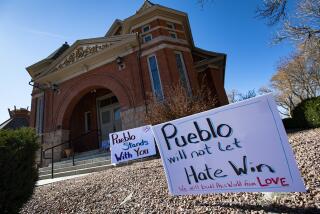Al Qaeda is just one suspect in attacks
- Share via
MADRID AND BOSTON — The sophistication of Wednesday’s assault in Mumbai and the targeting of U.S. and British citizens are the hallmarks of groups affiliated with Al Qaeda, but an array of other organizations have launched attacks in India and may also have played a role, officials and counter-terrorism experts said.
Experts cautioned that it was too early to fix responsibility for the coordinated attacks that killed dozens of people at a pair of luxury hotels, two hospitals, a train station and an upscale restaurant. They said the group that claimed responsibility, the Deccan Mujahedin, was unknown.
The State Department said this year in its annual assessment of terrorist threats that 2,300 people died in 2007 in attacks by various groups in India, making it perhaps the country most affected by terrorism in the world.
Indian intelligence agencies have been working with limited success in recent years to investigate hundreds of attacks. They have blanketed urban centers with agents -- especially Mumbai, because of the frequency of attacks there, said Sumit Ganguly, a South Asia counter-terrorism consultant to the U.S. government.
“It could be an entire range of organizations that have grievances against the Indian state and its growing closeness with the United States and the West,” said Ganguly, director of research at the Center on American and Global Security at Indiana University in Bloomington.
Some of India’s 130 million Muslims are angry about perceived discrimination in housing and employment by the Hindu majority. But India also suffers from violence by Maoists in eastern and central states and nationalists in northeastern states as well as militants from Pakistan and Bangladesh, according to State Department officials and reports.
Instead of the bombings that are the trademark of Al Qaeda, the attackers Wednesday appeared to use mostly automatic weapons and grenades, and they reportedly took hostages. But they showed sophistication and ambition by storming five-star hotels during the peak of the tourist season in a clear attempt to target Westerners, said M.J. Gohel, director of the London-based Asia-Pacific Foundation, a think tank that focuses on security issues.
“Sometimes this kind of attack, if well carried out, has greater psychological impact than a suicide bomber who blows up a few people somewhere,” Gohel said. “As a coordinated strike with multiple targets, it has all the fingerprints of an Al Qaeda-linked attack.”
The choice of India for such an assault could reflect the fact that increased security has made Western countries more difficult to hit, while India’s increasingly close alliance with the U.S. makes it a more desirable target, Gohel said.
The attackers reportedly inquired specifically about the whereabouts of British and American citizens.
“That is distinctive, in that in the past the Indians have been the targets of the attacks,” Ganguly said. “This adds a transnational dimension to the attacks.”
Besides launching attacks in Pakistan, a number of Pakistan-based extremist groups with connections to Al Qaeda, including Lashkar-e-Taiba, have been active in India. U.S. intelligence officials have said that in many cases militants work with Pakistani intelligence agents who share a common animosity toward India.
A U.S. counter-terrorism official agreed with experts that it was too early to rule out any group, especially since many have worked together -- and often with groups connected to Al Qaeda. The U.S. official spoke on condition of anonymity because he was not authorized to discuss the attack.
“Given the choice of targets, the coordinated nature of the assaults, one might think it is Islamic extremists. It is a fair theory. But at this point, it is just that -- a theory,” said the U.S. official. “But there have been a range of groups that have conducted attacks there, some of them very sophisticated.”
Al Qaeda has urged its followers to launch attacks in India in recent years, especially as the government established closer ties with the United States. And Washington has accused some members of Pakistan’s spy agency, the Inter-Services Intelligence, of playing a role in this year’s attack on the Indian Embassy in Afghanistan, where India is increasingly active.
The State Department report, the product of intelligence from across the U.S. government, also said that smaller groups of independent militants and crime groups continue to engage in violence, in part because of overburdened law enforcement and legal systems.
--
More to Read
Sign up for Essential California
The most important California stories and recommendations in your inbox every morning.
You may occasionally receive promotional content from the Los Angeles Times.










